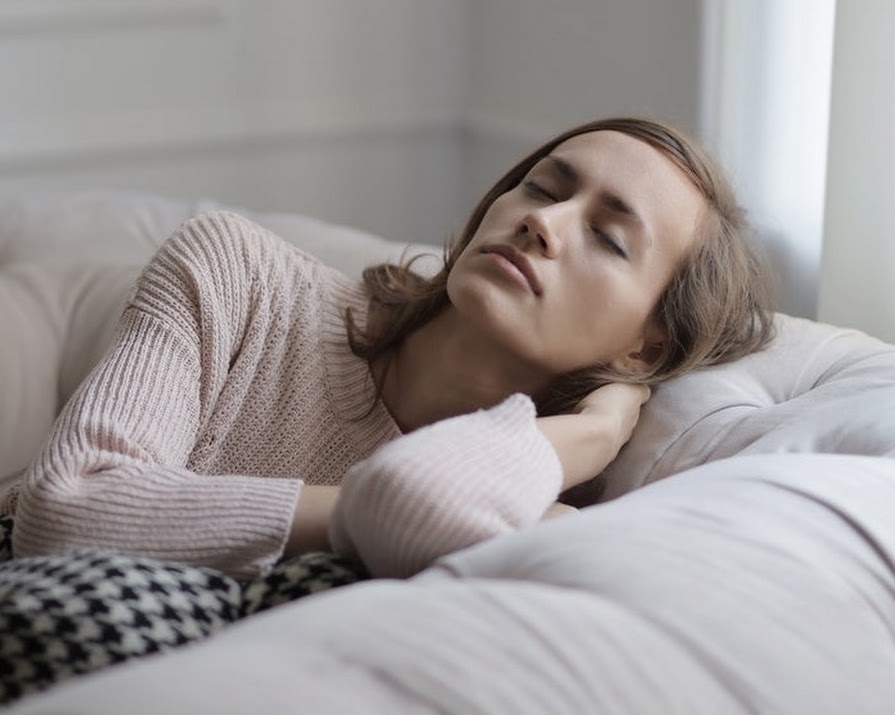By Grace McGettigan
07th Oct 2020
07th Oct 2020
We asked Dominique Antiglio, sophrologist and author of The Life-Changing Power of Sophrology, how to get a good night’s sleep when you can’t switch off
Has anyone else been struggling to get a good night’s sleep lately? With our homes suddenly functioning as makeshift offices and gyms, it can be difficult to also make it a relaxing place to sleep.
Dominique Antiglio, the author behind The Life-Changing Power of Sophrology, says, “There are a number of factors that contribute to preventing you from switching off, ranging from emotional to environmental to physiological and physical.” With sleep being crucial to maintaining a healthy immune system, finding a way to switch off at night has never been more important.
“If you find yourself wide awake and struggling to fall asleep,” says Dominique, “there are some things you can do.” They are:
1. Shift your focus
“First, try not to dwell on it, as it could encourage a vicious cycle,” she says. “Instead, I advise you to take the focus away from trying to sleep and place it on something else, something rhythmic like your breath.
“Combine with it a body scan to allow you to focus on other aspects of the body so that again, you’re not focused on sleep, and this will help you prime your body for sleep.
“Try the following three-step sophrology technique that is regularly used in sleep clinics across Europe for those struggling with sleep or insomnia:
– Focus on your body sensations and feel the movement of the breath. Are there any sensations of tightness in your body, worry in your mind or agitation as a whole?
– Inhale, clenching all the muscles in your body as you hold your breath, then do a long exhale to release all those tensions. Repeat five times and then pause, inviting your body into a relaxing body scan.
– Then concentrate on a positive, safe or relaxing image of your choice to prime your mind and body to feel comfortable and safe – key factors in helping you to fall asleep naturally. Repeat as many times as you need until your mind and body are so calm that you naturally fall asleep.
“Prolonged stress and anxiety puts the body into a constant state of agitation where it can affect the body’s ability to sleep. Then, if you start to believe you’re not going to sleep well, it exacerbates a vicious cycle. This is why practices like sophrology, which combines meditation, breathwork, visualisation and gentle body movements, can really help with sleep as it presses ‘reset’ on the mind, body and emotions that whirl around all day.”
2. Create a sanctuary
“The environment you’re in can impact sleep and your ability to switch off,” Dominique adds. “If you’ve experienced too much screen time before bed, if your immediate space is too noisy, or if you just don’t like or feel secure in your space, this can adversely impact sleep, so make the effort to turn your bedroom into a sanctuary, and surround it with things that you love and make you feel safe and positive.”
3. Tea (caffeine-free)
“Further create a positive environment for your sleep by rounding off the night with some verveine (also known as lemon verbena) tea. It’s naturally caffeine-free and has a soothing citrusy aroma, so ideal for easing the senses and helping you drift off to sleep,” she says.
4. Shower
“Just before bed, taking a warm (not hot or cold) shower or bath can help your body to regulate the ideal body temperate needed for sleep. It can also act as a metaphorical ‘washing away’ of the stress and worries of the day to help you into the right headspace for sleep.”
5. Adjust your lights
“Blue light-blocking glasses can be very useful in the home, especially if you have ‘cool white’ light bulbs or if you work on phones and laptops late into the evening.
“Changing bulbs to ‘warm’, or activating dark mode or night lights on devices, can also help with allowing the body to wind down when it’s nearly time for bed,” she says.
“However, stepping away from your devices that emit stimulating blue light (which keeps you alerts and awake) should be done at least an hour before bed to allow your body time to wind down. It will help you get to sleep more quickly and improve the quality of your sleep.”
6. Change your mindset
“As well as taking physical steps as per above,” Dominique says, “adjusting the mentality towards having an ‘early night’ or a ‘lie-in’, and viewing it as a positive routine, is also key to helping you sleep well and for longer.
“Think of it this way: more (and good quality) sleep makes us healthier, happier and more productive, not less!”
7. Exercise early
“Also, try to get enough movement in the daytime but avoid exercising later in the evening as it provides too much stimulation before bed, and can delay sleep or impact the quality of sleep, as it takes more time for the nervous system and muscle tension to settle.”
8. Find what works for you
“Plus, sleep apps might not be suitable for everyone – they may actually trigger more anxiety in people who are already quite anxious about sleep. Every routine and body is different, so find out what works for you.”
For more information on sophrology, visit Dominique’s website be-sophro.com.
Feature photo: Andrea Piacquadio from Pexels
Read more: ‘It’s really a big deal’: Jennifer Aniston shares her must-try sleep hack
Read more: 8 ways to turn your home into a gym without spending a cent
Read more: This breathing technique helped JK Rowling overcome symptoms of Covid-19























